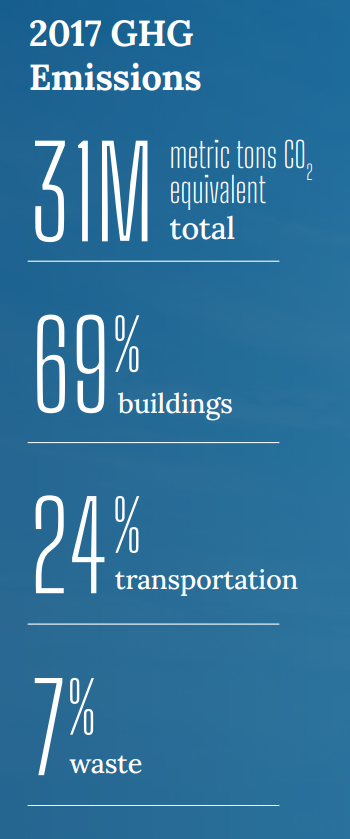Electrify Chicago
An independent tool for viewing City of Chicago building data
According to the
2022 Chicago Climate Action Plan,
69% of Chicago's emissions come from buildings, making
building emissions our biggest challenge and our biggest opportunity as a city
to tackle climate change. At Electrify Chicago, we showcase building performance using
publicly available data supplemented by community-submitted photographs and building
owners.
Start by looking at Chicago's buildings with the highest greenhouse gas intensity i.e. emissions per square foot. Large, efficient, buildings can perform much better than very inefficient small buildings on this metric.
New Article
📰 $30 Million In Missed Fines
The City Of Chicago failed to collect $30 million in potential fines from the building benchmarking ordinance, reducing transparency and accountability.
Legislative update! 🎉
As of late January 2024, legislation is being introduced to require new use more efficient forms of water and space heating, via the Clean And Affordable Buildings Ordinance (CABO), which will reduce the number of highly polluting and inefficient buildings that end up on this site.
If you're in Chicago,
write to your alderman to support the CABO!
Chicago Buildings by Greenhouse Gas Intensity
Note: Data includes large Chicago buildings with data from 2022, unless explicitly stated otherwise.
Note: This data only includes buildings whose emissions are reported
under the
Chicago Energy Benchmarking Ordinance. According to the City “As of 2016,
this list includes all commercial, institutional, and residential buildings larger than
50,000 square feet.” This dataset is also then filtered to only buildings with
reported emissions > 1,000 metric tons CO2 equivalent.
The latest year of data is from 2022, but we update the site regularly when new data is available, and some buildings may have failed to report that year, and only have older data available.
| Property Name / address | Primary Property Type |
Greenhouse Gas Intensity (kg CO2 eq./sqft) |
Total Greenhouse Emissions (metric tons CO2 eq.) |
|---|---|---|---|
|
Edward Everett Elementary School
🕰️
3419 S Bell Avenue
| K-12 School | 6.3 kg/sqft | 335 tons |
|
550 E 50th Pl
550 E 50th Pl
| Multifamily Housing | 6.3 kg/sqft
Lowest 48%
| 333 tons
Lowest 11%
|
|
Senior Suites of Norwood Park
5700 North Harlem Avenue
| Senior Living Community | 6.3 kg/sqft
Lowest 48%
| 591 tons
Lowest 33%
|
|
40 E Delaware Pl
40 E Delaware Pl
| Multifamily Housing | 6.3 kg/sqft
Lowest 48%
| 858 tons
Lowest 49%
|
|
3041 S Michigan Ave
3041 S Michigan Ave
| Multifamily Housing | 6.3 kg/sqft
Lowest 48%
| 424 tons
Lowest 19%
|
|
Hedgerow Condominium Association
🕰️
5400 S. Hyde Park BLVD.
| Multifamily Housing | 6.3 kg/sqft | 713 tons |
|
Jackson Towers Condo Association
5555 S Everett Ave
| Multifamily Housing | 6.3 kg/sqft
Lowest 48%
| 986 tons
Highest 46%
|
|
Chase Elementary -CPS
🕰️
(CPS)
2021 N Point St
| K-12 School | 6.3 kg/sqft | 536 tons |
|
Monroe Elementary -CPS
(CPS)
3651 W Schubert Ave
| K-12 School | 6.3 kg/sqft
Lowest 48%
| 756 tons
Lowest 44%
|
|
Ravenswood Elementary -CPS
(CPS)
4332 N Paulina St
| K-12 School | 6.3 kg/sqft
Lowest 48%
| 483 tons
Lowest 25%
|
|
Morrill Math/Science Spec -CPS
(CPS)
6011 S Rockwell St
| K-12 School | 6.3 kg/sqft
Lowest 48%
| 620 tons
Lowest 35%
|
|
Clay Elementary, Henry -CPS
(CPS)
13221 S Burley
| K-12 School | 6.3 kg/sqft
Lowest 48%
| 518 tons
Lowest 28%
|
|
Beidler Elementary -CPS
🕰️
(CPS)
3151 W Walnut St
| K-12 School | 6.3 kg/sqft | 549 tons |
|
Beethoven Elementary -CPS
🕰️
(CPS)
25 W 47th St
| K-12 School | 6.3 kg/sqft | 578 tons |
|
Dett
🕰️
2101 W Monroe
| K-12 School | 6.3 kg/sqft | 442 tons |
Data Source:
Chicago Energy Benchmarking Data
